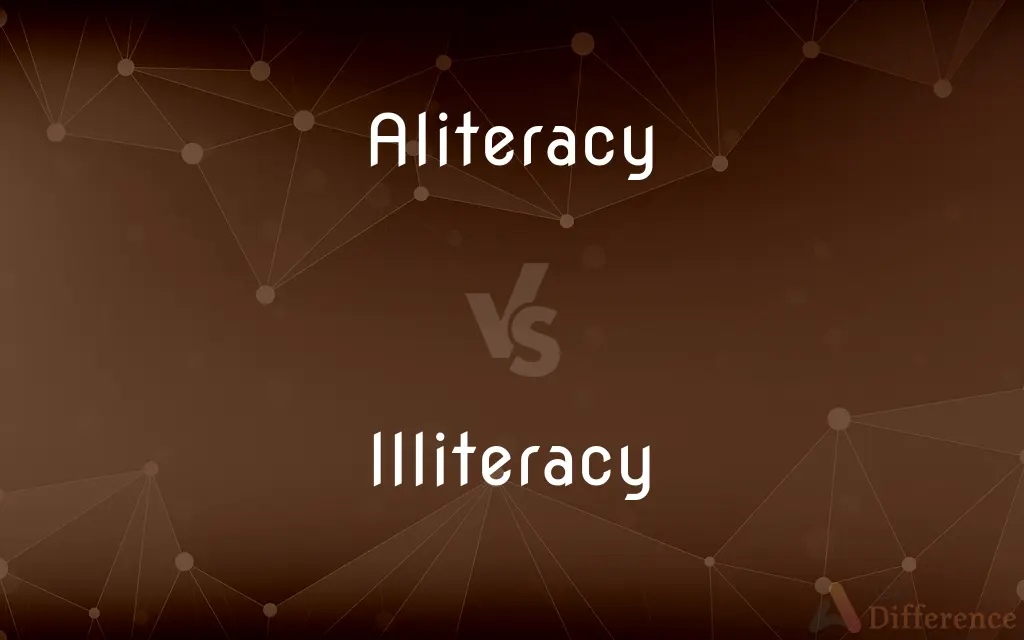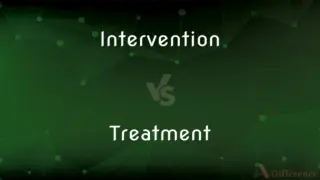Aliteracy vs. Illiteracy — What's the Difference?
By Urooj Arif & Fiza Rafique — Updated on April 23, 2024
Aliteracy refers to the ability but disinclination to read, while illiteracy indicates a lack of ability to read due to inadequate education or learning disabilities.

Difference Between Aliteracy and Illiteracy
Table of Contents
ADVERTISEMENT
Key Differences
Aliteracy characterizes individuals who can read but choose not to engage with text frequently, either due to lack of interest or preference for other media. Illiteracy, on the other hand, defines those who cannot read because they have not had the opportunity to learn or because of cognitive disabilities.
While aliterate people have the basic skills necessary to read and understand text, they often do not see reading as a rewarding or worthwhile activity. Illiterate individuals may want to read but are impeded by their lack of literacy skills, which limits their access to information and opportunities.
In contexts where reading is a fundamental skill for educational and job advancement, aliteracy can result in underutilization of potential, as aliterate individuals choose not to cultivate their reading abilities. Illiteracy, however, poses more severe socio-economic disadvantages, often perpetuating cycles of poverty and exclusion.
Educational systems target illiteracy through formal education and adult learning programs, focusing on teaching the mechanics of reading. Aliteracy, conversely, may require different strategies such as fostering a love of reading through more engaging and relevant materials.
Both aliteracy and illiteracy impact society, but in different ways: illiteracy by limiting personal and economic growth, and aliteracy by potentially wasting educational resources and abilities that are not being fully utilized.
ADVERTISEMENT
Comparison Chart
Definition
Ability to read but chooses not to
Inability to read due to lack of education or ability
Key Issue
Disinclination
Lack of skill
Solutions
Engagement strategies to increase interest in reading
Education programs to teach reading skills
Social Implications
Underutilization of reading skills
Economic and social exclusion
Targeted Interventions
Programs to promote reading as enjoyable and relevant
Literacy teaching and accessibility improvements
Compare with Definitions
Aliteracy
Often results from a preference for other forms of media.
Many teenagers today exhibit aliteracy, turning to social media and movies instead of books.
Illiteracy
Requires targeted educational interventions.
Adult literacy classes help address illiteracy among older populations.
Aliteracy
Condition of being able to read but choosing not to.
Despite being highly educated, he is aliterate, preferring to consume information through videos.
Illiteracy
Lack of ability to read and write.
Illiteracy rates are high in areas with limited access to education.
Aliteracy
Reflects voluntary non-engagement with text.
His aliteracy is evident from his well-stocked but untouched bookshelf.
Illiteracy
Social and economic implications.
Illiteracy contributes to a cycle of poverty that is difficult to break without intervention.
Aliteracy
Surfaces despite adequate educational opportunities.
She can read well but shows aliteracy by ignoring her school assigned readings.
Illiteracy
Can hinder job prospects and quality of life.
His illiteracy has kept him from applying for many jobs that require reading skills.
Aliteracy
Can contribute to a decline in general knowledge.
Aliteracy among students is a concern for educators trying to promote comprehensive learning.
Illiteracy
Often due to insufficient education or developmental disabilities.
Programs aimed at reducing illiteracy focus on early childhood education.
Aliteracy
Aliteracy (sometimes spelled alliteracy) is the state of being able to read but being uninterested in doing so. This phenomenon has been reported on as a problem occurring separately from illiteracy, which is more common in the developing world, while aliteracy is primarily a problem in the developed world.
Illiteracy
The condition of being unable to read and write.
Aliteracy
Able to read but not interested in reading. See Usage Note at literate.
Illiteracy
An error, as in writing or speech, made by or thought to be characteristic of one who is illiterate. See Usage Note at literate.
Aliteracy
The state of having the ability to read, but lacking interest in doing so.
Illiteracy
The condition or quality of being ignorant or unknowledgeable in a particular subject or field
Cultural illiteracy.
Scientific illiteracy.
Illiteracy
(uncountable) The inability to read and write.
Illiteracy is widespread in certain areas of the country.
Illiteracy
(uncountable) The portion of a population unable to read and write, generally given as a percentage.
Illiteracy
(countable) A word, phrase, or grammatical turn thought to be characteristic of an illiterate person.
Illiteracy
Unlearnedness; the state of being ignorant or unlettered.
Illiteracy
The state of being illiterate, or uneducated; lack of learning, or knowledge; ignorance; specifically, inability to read and write; as, the illiteracy shown by the last census.
Illiteracy
An instance of ignorance; a literary blunder.
The many blunders and illiteracies of the first publishers of his [Shakespeare's] works.
Illiteracy
Ignorance resulting from not reading
Illiteracy
An inability to read
Common Curiosities
Is aliteracy a problem if the person consumes information through other means?
While consuming information through other means is valid, aliteracy might limit exposure to complex ideas and deep thinking that often come from reading.
What causes aliteracy?
Aliteracy can be caused by a lack of interest in reading, preference for other media, or the perception that reading is not rewarding or relevant.
What are the effects of aliteracy?
Aliteracy can lead to underutilization of cognitive abilities, reduced general knowledge, and a potential decline in critical thinking skills.
How does society benefit from addressing aliteracy and illiteracy?
Addressing both increases overall educational engagement, improves job readiness, and enhances the cultural and intellectual richness of a community.
How can illiteracy be addressed?
Illiteracy can be addressed through formal education, literacy programs, and policies that ensure access to education for all ages.
What are the global trends in literacy and aliteracy?
Global literacy rates have improved, but aliteracy is on the rise, especially among younger generations influenced by digital media consumption.
How is illiteracy different from aliteracy?
Illiteracy is the inability to read due to inadequate learning opportunities or cognitive disabilities, whereas aliteracy is the choice not to read despite having the necessary skills.
Are there specific demographics more prone to aliteracy?
Younger people, particularly in affluent societies with abundant media options, tend to show higher rates of aliteracy.
How do aliteracy and illiteracy impact economic development?
Illiteracy directly affects economic development by limiting employment opportunities and productivity. Aliteracy can indirectly impact development by leading to a less informed and engaged workforce.
What strategies are effective against aliteracy?
Strategies include making reading material more relevant and enjoyable, integrating reading with technology, and promoting reading through role models and community programs.
Can technology help reduce illiteracy and aliteracy?
Yes, technology can help reduce illiteracy through educational apps and programs and can combat aliteracy by making reading more interactive and engaging.
What role do libraries play in combating aliteracy?
Libraries play a crucial role by offering diverse and engaging reading materials and programs that encourage regular reading habits.
How do illiteracy and aliteracy affect democracy and civic engagement?
Both can undermine democracy and civic engagement by creating populations that are less informed and less likely to participate in civic and political processes.
Can someone be both aliterate and illiterate?
Typically, these terms apply to different groups; however, someone could be functionally illiterate while also exhibiting aliteracy in the limited reading they can do.
What can parents do to prevent aliteracy in children?
Parents can prevent aliteracy by encouraging reading from an early age, making it a shared activity, and providing a variety of books that align with the child’s interests.
Share Your Discovery

Previous Comparison
Intervention vs. Treatment
Next Comparison
Kewl vs. CoolAuthor Spotlight
Written by
Urooj ArifUrooj is a skilled content writer at Ask Difference, known for her exceptional ability to simplify complex topics into engaging and informative content. With a passion for research and a flair for clear, concise writing, she consistently delivers articles that resonate with our diverse audience.
Co-written by
Fiza RafiqueFiza Rafique is a skilled content writer at AskDifference.com, where she meticulously refines and enhances written pieces. Drawing from her vast editorial expertise, Fiza ensures clarity, accuracy, and precision in every article. Passionate about language, she continually seeks to elevate the quality of content for readers worldwide.
















































